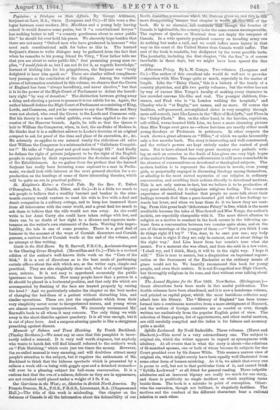Atherstone Pricey. By L. N. Comyn. Two volumes. (Longman and
Co.)—The author of this excellent tale would do well not to provoke comparison with Miss Yonge quite so much, especially in the matter of length. Like the "Daisy Chain," this is a history of the family of a country physician, and fills two portly volumes ; but the writer has not by way of excuse Miss Yonge's faculty of making every character in her crowded canvass life-like and real. The younger children, Con- stance, and Fred who is "in London walking the hospitals," and Charley who is " at Rugby," are names, and no more. Of course the- faultlesa, self-possessed, accomplished sister is very naughty through mere self-conceit, just like Laura in the "Heir of Redclyffe," and Flora in the "Daisy Chain." But, on the other hand, in the heroine, capricious, self-willed, warm-hearted little Lisa, we have a more charming picture than Miss Yonge ever gave us—whose heroines are mostly either meek young Goodeys or Professors in petticoats. In other respects the work shows a great advance on "Ellice," of which we spoke favourably only a few months back. The story is interesting and well-constructed, and the writer's powers are kept strictly under the control of goo& taste. Not to have abused her very great mastery over pathetic writ- ing on such an occasion as the death of Lisa gives one very high hopes of the author's future. The same sell-restraint is still more remarkable in the absence of conversations on devotional or theological subjects. The modern fashion is to represent the characters in novels, oven young- girls, as perpetually engaged in discussing theology among themselves, or alluding to the most sacred mysteries of our religion in ordinary conversation, and ascribing their actions directly to devotional motives- This is not only untrue in-fact, but we believe it to be productive of very great mischief, for it vulgarizes religious feeling. The common experience of mankind teaches that people no more talk about their feelings towards God than a pure-hearted girl talks of her feelings to- wards her lover, and when we hear them do it we know they are cant- ing. From this great fault "Atherstone Priory" is free, which is the more creditable because the tales of Miss Sewell and Miss Yonge, the author's models, are especially chargeable with it. The most direct allusion to. religion as a motive to conduct in the book occurs in tho following ex- tract from a conversation between two cousins quite alone, and on the eve of the marriage of the younger of them :—"' Don't you think I can do things right if I try?' ' Yes, dear, to be sure you can; any body can do what is right if they are only in earnest, and set about things in the right way' And Lisa knew from her cousin's tone what she meant. For a moment she was silent, and then she said in a low voice, I shall try, and I think, Mary, it will be in the right way. I hope it will." This is true to nature, but a disquisition on baptismal regene- ration or the Sacrament of the Eucharist as the ordinary means of grace would not be. We heartily recommend this book for young. people, and even their seniors. It is not Evangelical nor High Church,. but thoroughly religious in its tone, and that without ever talking about religion.






























 Previous page
Previous page